Description
What is web scraping? This is how you legally extract web content.
Scan products from a website and copy them to your website. up to 50,000,000 (50 million) products we can scrape a website and copy them to your website. Select how many products you want to scrape, then enter which website you want to scrape in the URL bar.
Although web scraping is a powerful tool, it also poses a significant threat to many web hosts. No matter which side of the server you are on, everyone has an interest in ensuring that web scraping is used responsibly and of course for a good cause. Web scraping is essentially storing information from websites on your own computer. This usually refers to the automated retrieval of information. You can compare this with taking screenshots of a website. Websites usually consist of several web pages. If you want to save the website, or parts of it, offline, you can take a screenshot of each web page. For a few pages this is not a problem. For many pages, this quickly takes a lot of time and quite a lot of storage space on your computer. It is then more convenient to automate it (read: let the computer do all the work). To tackle this smartly, delve into the source code of the website.
nPut all your applications, databases and WordPress site online and under one roof. Our comprehensive, powerful, feature-packed cloud platform includes:
- Easy setup and management in the reviewbuy dashboard
- 24/7 expert support
- The best Google Cloud Platform hardware with accompanying premium network, powered by Kubernetes for maximum scalability
- Enterprise-level Cloudflare integration for speed and security
- Global reach with 35 data centers and 275+ PoPs spread across the world
Have you ever wanted to compare prices from multiple sites at once? Or maybe automatically get a collection of posts from your favorite blog? It’s all possible with web scraping.
Webscraping is the process of extracting content and data from websites using software. For example, most price comparison services use web scrapers to read price information from different online stores. Another example is Google, which routinely scrapes or crawls the web to index websites.
Of course, these are just two of the many use cases of web scraping. In this article, we’ll look at the world of web scrapers in more detail, learn how they work, and see how some websites try to block them. Read on to learn more and start scraping!
What is web scraping?
Webscraping is a collection of practices used to automatically extract ? or ?scrape? ? data from the Web.
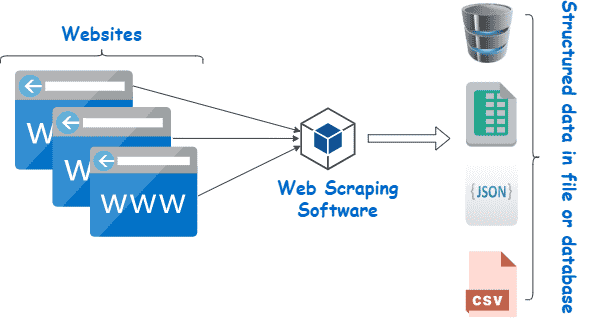
Other terms for web scraping are ?content scraping? or ?data scraping.? Whatever it is called, web scraping is an extremely useful tool for collecting online data. Applications of web scraping include market research, price comparisons, content monitoring and more.
But what exactly is ?scraping? web scraping ? and how is it possible? Is it legal? Wouldn’t a website want someone to come and scrape its data?
The answers depend on several factors. But before we dive into methods and use cases, let’s take a closer look at what web scraping is and whether it is ethical or not.
What can we scrape from the web?
It is possible to scrape all kinds of web data. From search engines and RSS feeds to government information, most websites make their data publicly available to scrapers, crawlers, and other forms of automated data collection.
Here are some common examples.
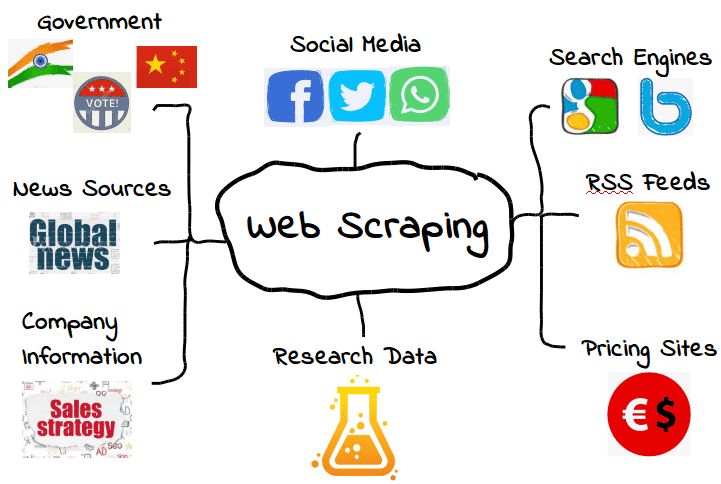
However, this does not mean that this data is alwaysavailable. Depending on the website, you may have to use a few tools and tricks to get exactly what you need ? assuming the data is accessible at all. For example, many web scrapers cannot extract meaningful data from visual content.
In the simplest cases, web scraping can be done via a website’s API or application programming interface. If a website makes its API available, web developers can use it to automatically scrape data and extract other useful information in a convenient format. It’s almost as if the web host provides you with your own ?pipeline? to their data. Talking about hospitality!
Of course, that’s not always the case ? and many websites you want to scrape don’t have an API you can use. Furthermore, even websites that do have an API will not always provide you with data in the correct format.
Therefore, web scraping is only necessary if the web data you want is not available in the form(s) you need. Whether that means the formats you want aren’t available, or the website simply doesn’t provide all the data, web scraping can help you get what you want.
While that’s all great, it also raises an important question: If some web data is restricted, is it legal to scrape it? As we’ll see in a moment, it can be a bit of a gray area.
Is web scraping legal?
For some people, the idea of web scraping can almost feel like stealing. After all, who are you to just ?grab? someone else’s data?
Fortunately, there is nothing inherently illegal about web scraping. When a website publishes data, it is usually available to the public and therefore free to scrape.
Because Amazon, bol.com, coolblue, for example, make product prices public, it is completely legal to scrape price data. Many popular shopping apps and browser extensions use web scraping for exactly this purpose, so users know they are getting the right price.
But not all web data is made for the public, which means not all web data is legal to scrape. When it comes to personal data and intellectual property, web scraping can quickly turn into malicious web scraping, resulting in fines such as a DMCA takedown notice.
What is malicious web scraping?
Malicious web scraping is the scraping of data that the publisher did not want to share or for which he did not give permission. While this data is usually personal data or intellectual property, malicious scraping can apply to anything not intended for the public.
As you can imagine, this definition has a gray area. While many types of personal data are protected by laws like the General Data Protection Regulation (GDPR) and the California Consumer Privacy Act (CCPA), others are not. But that doesn’t mean there aren’t situations where they can’t be scraped legally.

For example, suppose that a web host ?accidentally? makes its user information public. That could include a complete list of names, emails and other information that is technically public, but perhaps not intended to be shared.
Although it would be technically legal to scrape this data, it’s probably not the best idea. The fact that data is public does not necessarily mean that the web host has given permission to scrape it, even if the lack of oversight has made it public.
This ?gray area? has given web scraping a somewhat mixed reputation. While web scraping is certainly legal, it can easily be used for malicious or unethical purposes. That’s why many web hosts don’t appreciate having their data scraped ? regardless of whether it’s legal.
Another form of malicious web scraping is ?over-scraping,? where scrapers send too many requests in a given period. Too many requests can put enormous pressure on web hosts, who would much rather spend server resources on real people than on scraping bots.
As a general rule, use web scraping sparingly and only when you are completely sure that the data is intended for public use. Remember that just because data is publicly available does not mean it is legal or ethical to scrape it.
What is web scraping used for?
At its best, web scraping serves many useful purposes across many industries. As of 2021, almost half of all web scraping will be used to support e-commerce strategies.
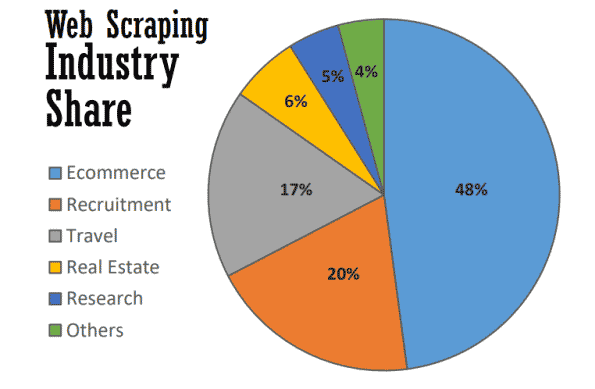
Webscraping has become the backbone of many data-driven processes, from tracking brands and providing up-to-date price comparisons to conducting valuable market research. Here are some of the most common.
Market research
What do your customers do? What about your leads? How do your competitors’ prices compare to yours? Do you have enough information to set up a successful inbound marketing or content marketing campaign?
These are just a few of the questions that form the cornerstones of market research ? and the very same ones that can be answered with web scraping. Because much of this data is publicly available, web scraping has become an invaluable tool for marketing teams who want to keep an eye on their market without having to do time-consuming manual research.
Business automation
Many of the benefits of web scraping for market research also apply to business automation.
Where many business automation tasks require collecting and processing large amounts of data, web scraping can be invaluable ? especially when it would otherwise be cumbersome.
For example, suppose you need to collect data from ten different websites. Even if you collect the same type of data from each website, each website may require a different extraction method. Instead of manually going through various internal processes on each website, you can use a web scraper to do this automatically.
Generating Leads
As if market research and business automation weren’t enough, web scraping can also generate valuable lists of leads with little effort.
Although you need to set your goals with some precision, web scraping can generate enough user data to create structured lead lists. Of course, results may vary, but it’s more convenient (and more promising) than building lead lists yourself.
Price tracking
Price extraction ? also called price scraping ? is a of the most common web scraping applications.
Here is an example of the popular Amazon price tracking app Camelcamelcamel. The app regularly scrapes product prices and then compares them on a graph over time.
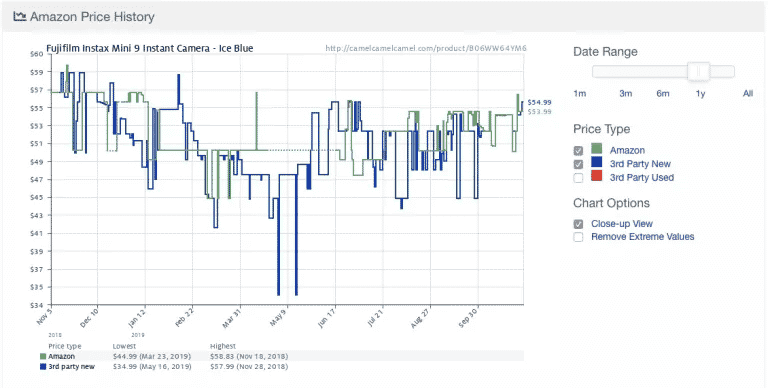
Prices can fluctuate wildly, even on a daily basis (look at the sudden price drop around May 9 !). With access to historical price trends, users can determine whether the price they are paying is ideal. In this example, the user might choose to wait a week or so in hopes of saving $10.
Despite its usefulness, prices scraping comes with some controversy. Since many people want real-time price updates, some price tracking apps quickly turn malicious by overloading certain websites with server requests.
As a result, many e-commerce websites have started taking extra measures to block web scrapers altogether, which we’ll cover in the next section.
News and content
Nothing is more valuable than staying informed. From monitoring reputations to tracking industry trends, web scraping is a valuable tool for staying informed.
Although some news websites and blogs already offer RSS feeds and other convenient interfaces, they are not always the norm ? nor as common as they used to be. Collecting exactly the news and content you need often requires some form of web scraping.
Brand monitoring
If you’re scraping the news anyway, why not check your brand right away? For brands that are in the news a lot, web scraping is an invaluable tool to stay informed without having to sift through countless articles and news sites.
Webscraping is also useful to check the minimum available price (MAP) of a brand’s product or service. While this is technically a form of price scraping, it is an important insight that can help brands determine whether their pricing is in line with customer expectations.
Real estate
If you’ve ever looked for an apartment or bought a house, you know how much there is to arrange. With thousands of listings spread across multiple real estate websites, it can be difficult to find exactly what you’re looking for.
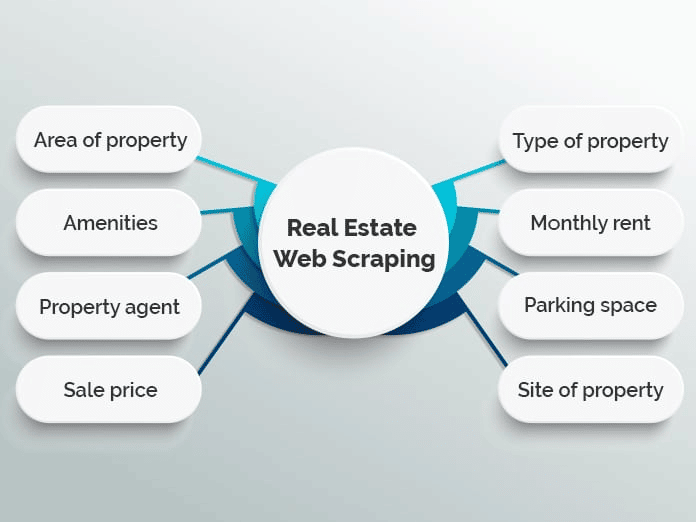 How does web-scraping work?
How does web-scraping work?
Webscraping may sound complicated, but it is actually very simple.
While the methods and tools may vary, all you need to do is find a way to (1) automatically browse your target website(s) and (2) extract the data once you get there. Typically, these steps performed with scrapers and crawlers.

